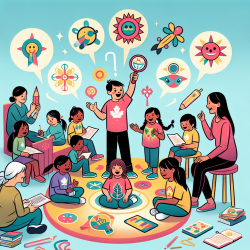Introduction
In today's culturally diverse world, understanding the nuances of multicultural socialization is crucial for practitioners working with adolescents. The recent study titled "A Person-Centered Analysis of Adolescent Multicultural Socialization Niches and Academic Functioning" sheds light on how different socialization experiences across school, peer, and family settings impact adolescents' academic functioning. This blog explores the key findings and implications of this research, offering insights for practitioners to enhance their skills and encourage further exploration.
Understanding Multicultural Socialization Niches
The study utilized a person-centered approach to identify six distinct multicultural socialization niches among adolescents. These niches varied in the degree and consistency of multicultural socialization experiences across school, peer, and family settings. The niches were categorized as:
- Cross-setting similar higher socialization
- Cross-setting similar moderate socialization
- Cross-setting similar lower socialization
- Cross-setting dissimilar peer contrast
- Cross-setting dissimilar greater peer contrast
- Cross-setting dissimilar school contrast
The study found that adolescents in the cross-setting similar higher socialization niche demonstrated greater emotional and behavioral academic engagement compared to those in other niches. This highlights the importance of cohesive multicultural socialization experiences for promoting academic success.
Implications for Practitioners
Practitioners can leverage these findings to enhance their skills and interventions. Here are some actionable insights:
- Foster Cohesive Socialization: Encourage consistent multicultural socialization across school, peer, and family settings. This can be achieved by promoting collaboration between educators, parents, and peers to align multicultural values and practices.
- Targeted Interventions: Identify adolescents in cross-setting dissimilar niches and provide targeted interventions to address the inconsistencies in their socialization experiences. This may involve workshops or counseling sessions that focus on multicultural competencies.
- Promote Multicultural Competencies: Develop programs that emphasize the development of multicultural competencies, such as cultural awareness and appreciation, to enhance adolescents' academic engagement and expectations.
Encouraging Further Research
While this study provides valuable insights, it also highlights the need for further research in the field of multicultural socialization. Practitioners are encouraged to explore the following areas:
- Longitudinal studies to examine the long-term impact of multicultural socialization on academic functioning.
- Exploration of additional factors, such as socioeconomic status and parental education, that may influence multicultural socialization experiences.
- Investigation of the role of digital and online environments in shaping multicultural socialization among adolescents.
Conclusion
The study "A Person-Centered Analysis of Adolescent Multicultural Socialization Niches and Academic Functioning" offers valuable insights into the impact of multicultural socialization on adolescents' academic functioning. By understanding and implementing the findings, practitioners can enhance their skills and contribute to better outcomes for children in culturally diverse settings. To read the original research paper, please follow this link: A Person-Centered Analysis of Adolescent Multicultural Socialization Niches and Academic Functioning.










